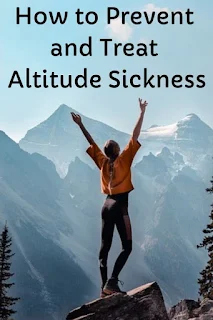Don't let altitude sickness ruin your next high country vacation. It is easy to get altitude sickness quickly and at the most inopportune times.
High Altitude Vacations
You might be planning that winter ski trip or summer hiking in the mountains or higher elevations. It is always good to acclimate yourself for a little while before starting your activities.
Some professional sports team will get to Denver a day or two early to become acclimated to the altitude before a game.
The average elevation of Denver is about 5,300 feet above sea level, which is much lower than the mountain resorts west of Denver in the Rocky Mountains.
Altitude Sickness Symptoms
The symptoms from altitude sickness also known as acute mountain sickness (AMS) can show up in a person from six to 72 hours after arriving at high altitude and should go away by the fourth day at most. The first symptoms of altitude sickness are:
- Headache
- Lightheadedness
- Hyperventilation
- Trouble sleeping at night or frequent waking
- Weakness
- Upset stomach
If you get any these symptoms, don’t go any higher in elevation and or go lower until these symptoms go away. These could be normal physiological changes until your body becomes used to the higher elevations or they could be the start of altitude sickness. More severe symptoms of altitude sickness include:
- Difficulty breathing even when resting
- Coughing
- Confusion
- Trouble walking in a straight line
- Vomiting
If you get these more severe symptoms you need to get to a lower elevation and get to a doctor. The doctor can prescribe high altitude medication.
How to Acclimate Yourself for High Altitudes
Following these simple precautions should help you avoid or minimize the effects of high altitude.
- Stay a day at a lower elevation. I know that when you’re on vacation time is limited and you want to get right at it. If possible stay at a lower elevation for a day or two to get your body used to higher altitudes.
For example, staying in Denver or Salt Lake City for a day and a night would be very helpful. If that isn’t possible, stay at the main resort for a day and a night before heading up higher. - Even when you get up to higher elevations to start skiing or hiking, take it easy the first couple of days, don’t over do it and you can enjoy the entire trip.
- Avoid alcohol. Having just one drink at higher altitudes is the equivalent of several drinks at sea level. The air is much drier at higher altitudes and alcohol is dehydrating making the mildest of symptoms worse.
- Drink a lot of water and stay hydrated, at least 1 to 1.5 gallons (4-6 liters) per day. This helps your kidneys flush out the bicarbonates that accumulate due to a higher respiratory rate. You need to stay hydrated at higher altitudes.
- Eating lighter, increase the carbohydrates and eat less protein and fats.
- Avoid any medication that interferes with your normal sleeping habits such as sleeping pills.
Since it is much drier at higher elevations, this can dry out the mucus membranes of your nose and you could get a bloody nose. Using some sort of gel that will keep your nose moist is a good idea.
One of the best gels for this is a product called Ayr (pronounced air). You should be able to find it at any pharmacy and on Amazon.
Products that are petroleum based such as Vaseline can actually inhibit airflow in the nose and should only be used if that’s all you have. Also ,bring and use lip balm for the same reasons.
Conclusion
Altitude sickness can hit you one trip and not the next and it varies from person to person, also depending on age and fitness level. Taking the simple precautions listed you should have no problems and enjoy your high country vacations.
About the Author
Sam Montana is a certified Food Over Medicine instructor from the Wellness Forum Health Center and certified in optimal nutrition from the Harvard T.H. Chan School of Public Health.
Copyright © 28 December 2008-2019 Sam Montana

